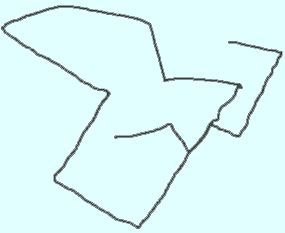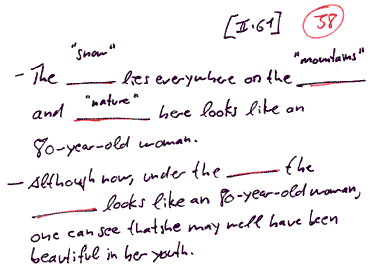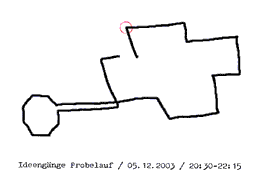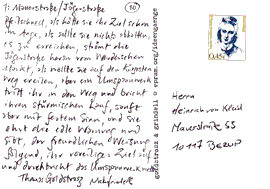
Ideengänge (2004)
Thomas Goldstrasz and Nick Grindell

»»» Deutsch

|
Ideengänge (2004)Thomas Goldstrasz and Nick Grindell
|
»»» Deutsch |
|
I d e e n m a g a z i n |
Peripatetic Phrase PerpetuationAn introduction to the "Ideengänge" project
|
|
During the Hot Summer, one burning issue for epram.org was documentation: how to satisfy the desire for a record of one's walks without getting bogged down in the process; how to avoid spending time compiling documentation that might be better spent walking; how to prevent the compulsion to document from shaping the walk; how to ensure that documentation achieves its potential and reaches its audience. In a letter dated November 18, 1800, the German dramatist Heinrich von Kleist (1777-1811) speaks of a notebook (the "Ideenmagazin") containing a collection of text fragments representing "ideas" for use in his writing, especially in his correspondence, where the same "idea" often appears more than once, sometimes years apart, with just a few words altered to fit the context (more detail on this, in German, here). By analysing Kleist's works, we were able to reconstitute his writer's toolkit, giving us a catalogue of convenient bite-size raw material from which to automatically generate documentation for our algorithmic walks as we went along, picking one of Kleist's ideas at every turn, with just a few words altered/substituted to fit the context, matching a generative approach to walking with a generative mode of documentation. For the mammoth task of extracting the ideas from Kleist's correspondence, we stood on the shoulders of Helmut Sembdner (1914-1997), whose edition of Kleist's letters highlights all repeated passages that might have featured in the original "Ideenmagazin". Once these had been isolated and ordered (view the reconstituted "Ideenmagazin" - in German), we filtered out those unsuitable for the "Ideengänge" project and transcribed the remaining 39 ideas to index cards for easy reference during walks, noting variants and indicating which elements could be omitted or substituted to match the street corner in question and how it made us feel (view the English version of these idea cards). | |

| |
|
Taking another cue from socialfiction.org, the "Ideengänge" (literally "idea walks", but with reference to "Gedankengänge", meaning "trains of thought") were conceived as a programme running on the hardware of the street grid. Each walk is triggered when a given number of requests has been received from subscribers, who are then sent one postcard each from a single street corner along the trajectory, described in the words of Heinrich von Kleist (himself an enthusiastic walker), with minor contextual alterations. (Pursuing this analogy still further, one might say that we use Kleist's ideas like tags in a custom version of socialfiction's Psychogeographical Markup Language. But that would definitely be taking things too far.) | |
|
M r v o n K l e i s t |
For the test run, we used the classic urban exploration haiku "2nd right, 2nd right, 1st left, repeat" and started walking from Mauerstrasse 53, the address where Kleist spent the last two years of his life (the actual house was demolished in 1912). Although the weather was cold and misty, we were full of joy as we progressed along the route, as things unfolded smoothly from the start (Herr Goldstrasz had spent time committing the individual ideas to memory, enabling him to make swift and apposite selections). Although the narrative drive often experienced during constrained walks is broken down in this case by focussing on an isolated episode at each turn rather than developing a single ongoing story, the fact that the algorithm returned us unexpectedly to the back of the same house we started in front of gave the walk a satisfyingly rounded character, leaving us feeling we had inscribed an invisible poem in space and time. As the project ripened, we became convinced that Herr von Kleist would have approved. To make sure, we addressed the twelve postcards generated by the test walk (in German, handwritten in pencil, with a drawing of the walk route and a circle round the corner in question) to him at his last earthly domicile. Prospective subscribers can view these test postcards here. The cards generated during all future "Ideengänge" walks will NOT appear on this site. Each subscriber will receive the original postcard and no copy will be made. |


| |
|
If you wish to receive an "Ideengänge" postcard (physical mail, delivered by the postman, make excellent bookmarks), please send your request to ideengaenge at epram dot org with the street address you want it sent to and whether you want the text to be in German or English. | |
|
And of course, anyone wishing to download and modify our "Ideenmagazin" toolkit, in German or in English, to carry out their own "Ideengänge" (or for any other purpose) is actively encouraged to do so. We would be interested to hear about the results of any such usage. |

|
Goldstrasz & Grindell |